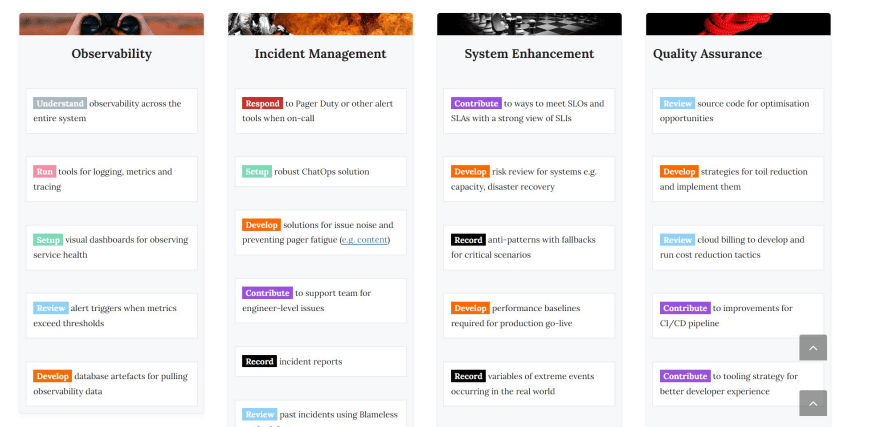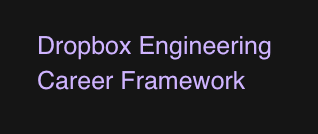Now that you’re warmed up on the truths of career progression, let’s explore how to do it well.
In parts 1 and 2, we covered the 3 lesser known truths of career progression.
That was just to whet your appetite to think more about your own growth journey.
Let’s now get practical and explore ways for you to grow as an SRE 👐🏽
The first thing we will explore is the mindset difference between a junior and senior SRE
Difference between how a junior SRE and a senior SRE think
How a Junior SRE thinks
I have skills and can learn and do tasks, but lack a deep understanding of any specific area.
I’ll perform well as long as I stick to the task list.
I need a little or a lot of help from senior SREs.
How a Senior SRE thinks
I can do all that a junior SRE can do… and much more.
But I shouldn’t do what they do, because there’s so much more else to do.
I often deep-dive business and platform critical areas, that are essential to how we do things here.
I build the tasks for junior SREs to execute, while I think about how to improve the system.
A more senior SRE differs from an early-career SRE in terms of:
- Scope of work — senior SREs will always have a broader scope of work, not finite tasks
- Foresight — senior SREs have a longer timespan view of the work
- Business value — senior SREs need to drive business value in their decision-making
Keep in mind that it’s not a jump step from entry-level SRE to senior SRE.
There are multiple grade levels that SRE can and will experience in their career progression.
This depends a lot on the organization and will involve an increase in:
- Responsibility (the type and scope of work you do)
- Realm of influence (how many people you communicate with and impact)
- Leadership traits (self-explanatory)
- Capabilities (a value-driver from combining abilities, skills, and resources)
I will share links to frameworks from Dropbox and Gitlab that cover these in more detail.
But you should not jump into them directly. You have to plan your progression as a foundation.
As a quick aside, check out the conversation I had with Rajesh Reddy N who is a Staff Engineer in DevOps.
He shared great advice for SREs seeking career progression. A lot of his thinking revolves around having the right mindset to focus on the value drivers in your work context 🤯
Planning your progression through frameworks
There’s a saying that failing to plan means planning to fail.
Let’s avoid that pitfall and map out our journey to career success.
Think of it like having a GPS for your professional growth – and that’s where frameworks come in.
These trusty tools can be your guiding stars as we explore how to navigate the ever-changing world of work.
So, let’s dive in and discover how these frameworks can be your secret to making strides in your career!
Below is my original SRE capability map from mid-2021 👇🏼

My thinking on it has evolved a lot and I kept notes aside for future paid consulting work (not happening anymore) to cover my costs of doing this advocacy.
It will stay under wraps because this takes a huge mental and time expense to create and I can’t justify it without getting paid!
You get the idea and can probably make your own. I highly encourage you to do so.
A capability map shouldn’t be too technical, as it can detract from the full value drivers that support the organization’s and subsequently your role’s needs.
I found an example that will satisfy some of the stack-centric minds reading this…
Elliot Graebert’s DevOps responsibilities table 👇🏼
Elliot has a more nuanced technical view on DevOps and infra work. His spreadsheet gives a more technical overview of what you should know like the back of your hand
Existing career progression frameworks
Dropbox and Gitlab famously released their SRE career progression frameworks for everyone to see.


I would not rely on these as a sole source of truth if you are outside of these organizations, as every workplace emphasizes different abilities at different grade levels.
8-step process to plan your career growth
- put your ear to the ground
- understand what the team’s and organization’s priorities are
- synthesize your findings into an analysis
- look at the technical capabilities that are rewarded
- look at the non-technical capabilities that are rewarded (they don’t change as much)
- map out what you are at right now
- work out the gaps between your current state and the required future state
- start working on the skill and ability development
This is the process I’ve used over the years to develop fairly green individual contributors into experienced leads. It works.
Wrapping up
So, there you have it!
Career progression in Site Reliability Engineering isn’t just about how long you’ve been around or collecting certifications.
It’s more of a steady journey than a sudden campaign.
More advanced certifications are great but they are only part of the promotion/progression equation.
You now know that junior and senior SREs think very differently, with seniors focusing on bigger scopes and business value.
That’s the kind of mindset and skillset you need to nurture to be a solid senior role candidate in the future.
Planning your career growth involves understanding your team’s needs, technical and non-technical capabilities, and closing the skill gaps.
And hey, there are cool frameworks like Dropbox and Gitlab’s to check out. They’re helpful, but remember, one size doesn’t fit all.
Start by listening, synthesize what you find, and analyze.
See what skills matter, know where you are now, figure out what’s missing, and then get to work on leveling up those abilities.
The journey may have its ups and downs, but that’s what makes it exciting.
Stay committed to learning, and you’ll go far in your SRE career!
That’s all for this 3-part series on Growing as an SRE.
I’ll be covering more specifically on observability for the next few issues, so keep an eye out for my emails.
And if you are a friend who cares, share it with your SRE friends 😉
- #34 From Cloud to Concrete: Should You Return to On-Prem? – March 26, 2024
- #33 Inside Google’s Data Center Design – March 19, 2024
- #32 Clarifying Platform Engineering’s Role (with Ajay Chankramath) – March 14, 2024